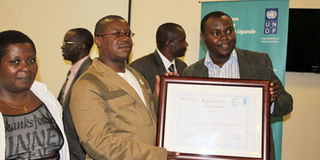Tea farmers group recognised for efforts to combat climate change

Representatives of Kayonza Tea Growers Factory receive a certificate of recognition from UNDP for their efforts in combating climate change while conserving the environment. PHOTO BY EDGAR R. BATTE
In the face of global challenges like climate change, there are communities working towards adapting their business accordingly while conserving the environment.
Last week, Kayonza Tea Growers’ Factory, from Kanungu District, was recognised by United Nations Development Programme (UNDP) for advancing local solutions to protect the environment.
They were among the winners for the 2015 Equator Prize at the recent Global Conference on Climate Change in Paris, France.
Explaining about their climate change mitigation strategies, Gregory Mugabe, Kayonza’s chairman, pointed out that the factory’s operations involve consumption of large quantities of water, fuel, fuel wood, electrical energy and chemicals.
Best practices
“Our goal is to conserve the biodiversity of entire areas of operation, for example, we have planted trees to prevent landslides. These and other activities help us in our fight against degradation and climate change,” he said.
He added that they ensure sound environmental practices such as proper drainage in and around the processing site, proper waste disposal, proper waste water treatment by use of lagoons and using environmentally friendly methods in disposing polythene and plastic wastes.
The tea factory is adjacent to Bwindi Impenetrable National Park, one of Uganda’s oldest rainforests and home to 50 percent of the world’s mountain gorillas. It is owned by 7,205 smallholder tea farmers.
With their community facing deforestation, wetland encroachment, soil degradation and water shortages.
The community enterprise ensures at least 70 per cent of the population is involved in a landscape-scale, community-led climate change adaptation and mitigation strategy that addresses energy efficiency, food and income security and natural resource management.
Triple win
In her remarks, the United Nations (UN) resident coordinator and UNDP resident representative, Rosa Malango, noted such efforts rarely happen in isolation from the broader context within which the groups operate.
“Where political and legal space to act is opened up, the ability of local groups to innovate increases. And where the enabling conditions are aligned, scaling-up for transformational change becomes possible.”
She applauded the group for the reminder about the importance of local communities in the implementation of the Paris Agreement as well as Agenda 2030 and its 17 Sustainable Development Goals (SDGs).
Through these efforts, more than 4,800 smallholders have benefited with the introduction of kitchen gardens and new staple or cash crops, such as beans, banana, Irish potato and ground nuts.
More than 4,000 farmers have been trained in conserving wetlands, riverbanks and natural forests. Over 20,000 indigenous trees have been planted on farm borders and degraded hillsides.
Ms Malango observed: “This initiative is a model of smallholder-led adaptation to climate change, integrated ecosystem restoration, reforestation and eco-agriculture and is a great example of what we describe as “triple win” approaches, where initiatives deliver economic, social, and environmental benefits simultaneously.”
At the same event, Isa Katwesigye, senior forestry officer, Ministry of Water and Environment, thanked Kayonza for flying Uganda’s flag high through its various initiatives towards climate change adaptation.




